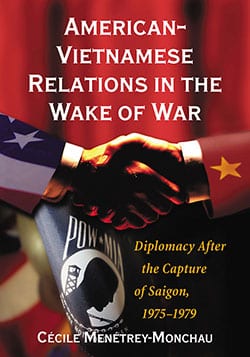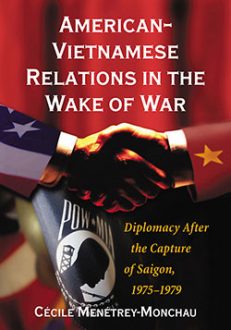American-Vietnamese Relations in the Wake of War
Diplomacy After the Capture of Saigon, 1975–1979
$39.95
In stock
About the Book
When the Vietnam War ended with the North Vietnamese capture of Saigon on April 30, 1975—27 months after a cease-fire had been signed in Paris—the differences between the United States and Vietnam were far from being resolved. Mutual bitterness regarding the war remained. Newly unified Vietnam wanted normalization of relations and the subsequent economic reconstruction aid promised in the Paris Peace Accords. Understandably wary of such diplomatic relations, the United States requested information regarding soldiers listed as missing in action and assistance with the repatriation of military remains. A series of misconceptions and misunderstandings as well as changes from a regional to a global U.S. foreign policy left both countries bereft of an easy solution.
This book describes the negotiations during the late Ford and early Carter administrations (1975–1979) and discusses the repercussions the diplomatic stalemate had on the domestic and international politics of the United States and Vietnam, emphasizing the conflicting priorities and political goals of both countries, at home and abroad. This previously neglected period in United States-Vietnam relations deals with issues such as Hanoi’s constant exultation over the victory, American denial of responsibility, the division between the presidents’ public declarations and congressional policies, and both sides’ use of the MIA issue. Based primarily on recently declassified documents and former U.S. official Douglas Pike’s uncensored collection, the work also makes use of media press sources from America, Vietnam, Britain, France and China. Interviews with Vietnamese immigrants and former U.S. politicians provide insight unavailable in written histories. Appendices contain the February 1973 correspondence between President Nixon and the Prime Minister of the Democratic Republic of Vietnam, six diplomatic notes from 1976, and a January 30, 1979, letter from President Carter to Chinese Vice Premier Deng Xiaoping.
About the Author(s)
Bibliographic Details
Cécile Menétrey-Monchau
Format: softcover (7 x 10)
Pages: 316
Bibliographic Info: appendices, notes, bibliography, index
Copyright Date: 2006
pISBN: 978-0-7864-2398-9
eISBN: 978-1-4766-0977-5
Imprint: McFarland
Table of Contents
Acknowledgments vi
Preface 1
Abbreviations 5
Important Names and Offices 7
Introduction 11
I : FORD AND VIETNAM’S PEACE
• A New Start for Vietnam and a First Opening to Washington 21
• Hanoi and Saigon’s Application for Membership to the United Nations 32
• Adapting to a New Environment: Vietnamese Policies and Ford’s Election Campaign 51
II : THE ADVENT OF THE CARTER YEARS
• The Fourth Party Congress 77
• The New Socialist Man, the New American Man and the New China 83
• The Woodcock Mission 91
III : TALKS TURN COLD
• The Paris Negotiations ( January–May 1977) 108
• The Nixon Letter 115
• Background to the Nixon Letter 121
• The Paris Negotiations ( June and December 1977) 130
• The Spying Affair 144
IV : COLD WAR CLASH
• Brotherhood Turns Sour 148
• Vietnam Changes Its Mind 151
• The Hoa Crisis 154
• Vietnam’s Dual Opening to Moscow and Washington 161
• Brzezinski’s Growing Influence and His Visit to China 165
• Consequences of the Brzezinski trip to China on the NSC Perception of the Sino-Cambodian-Vietnamese Conflicts 173
V : REVERSAL IN U.S. FOREIGN POLICY
• Vietnam’s American Card 176
• The Thach Delegation to New York 192
• The Drawing of Lines 203
• Normalization with Peking 210
VI : WINNING THE THIRD VIETNAM WAR
• Vietnam Invades Cambodia 217
• Deng’s Visit to the United States 221
• China’s Lesson on Vietnam 227
Conclusion 235
Appendices 243
Chapter Notes 255
Bibliography 291
Index 301
Book Reviews & Awards
“highly recommended”—Choice.





